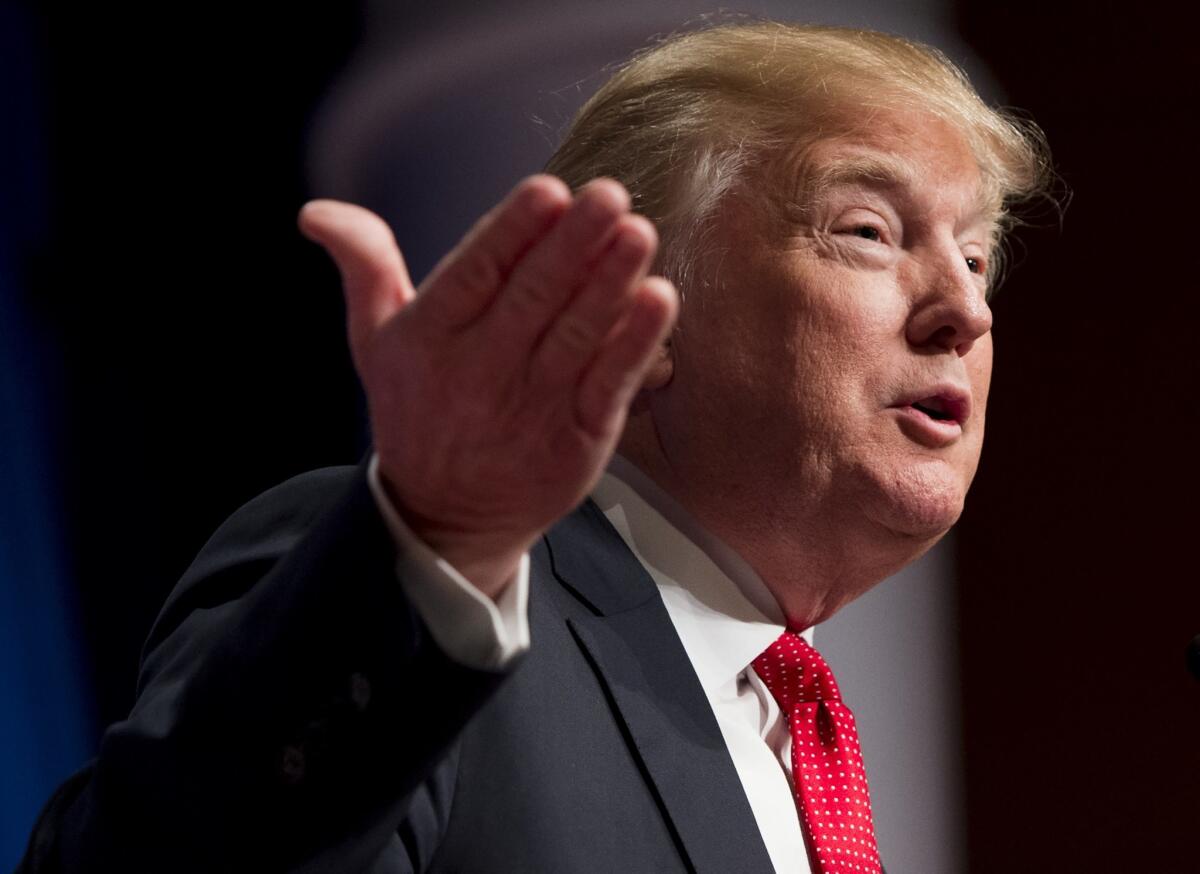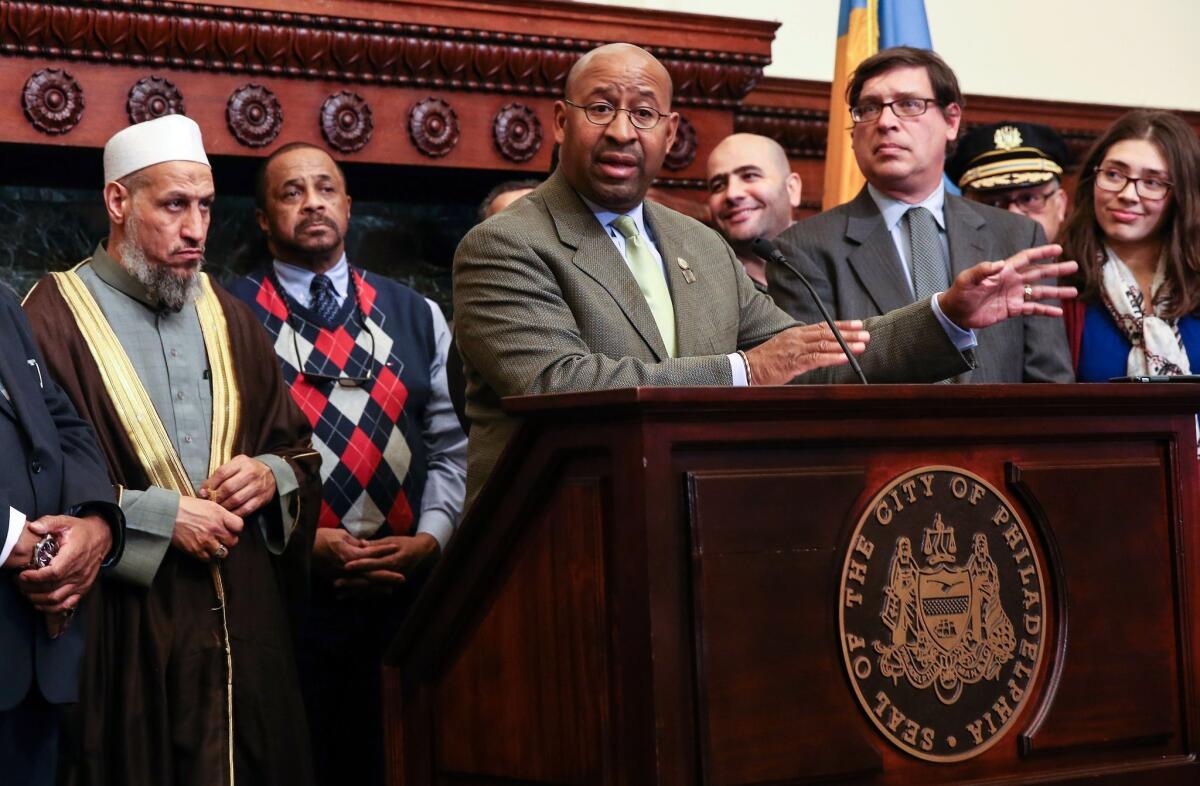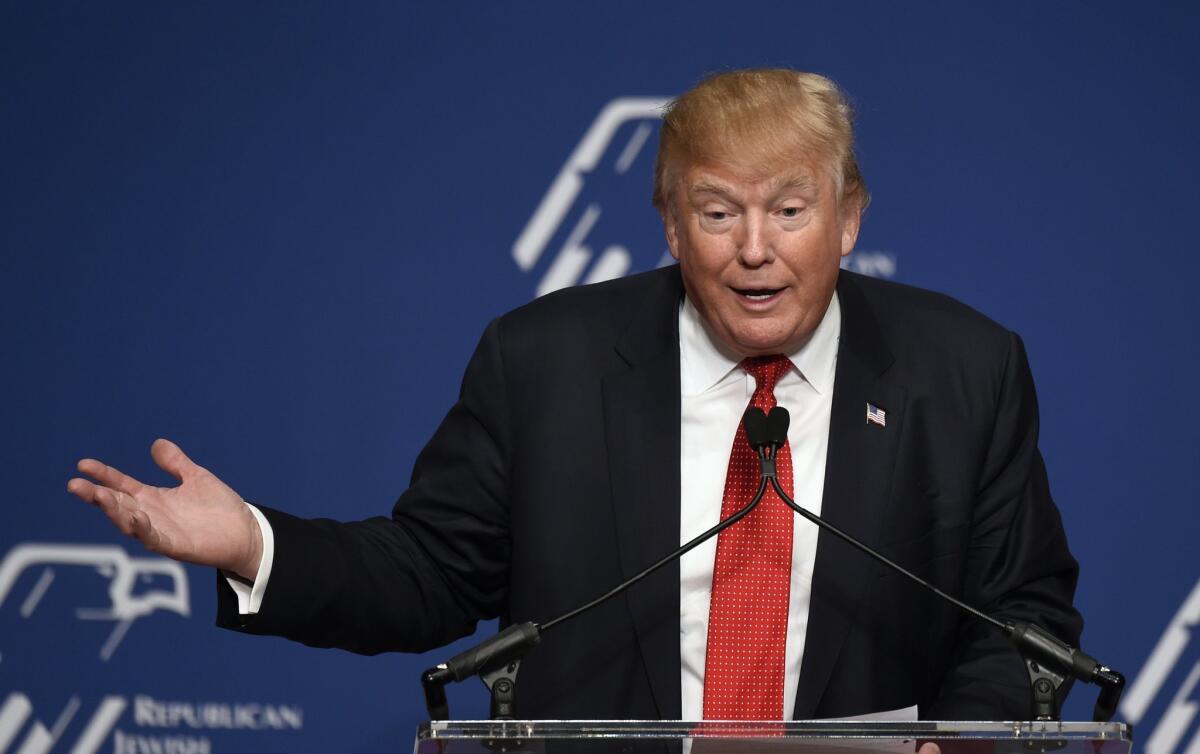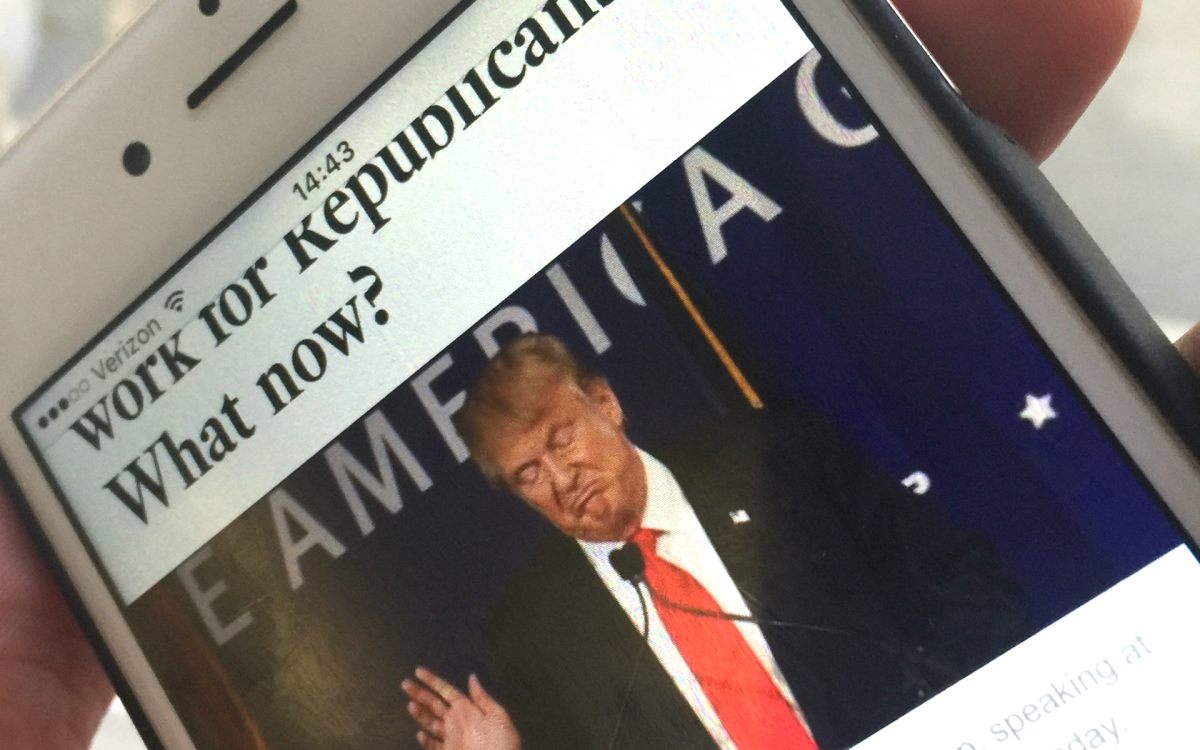Some U.S. mayors want Donald Trump to stay out of their cities
By the numbers
Welcome to Trail Guide, your host through the wilds of the 2016 presidential campaign. It's Wednesday, Dec. 9, and here's what we're talking about:
- Some U.S. mayors have a message for Donald Trump : Stay away
- Lawmakers in Israel denounce Trump's planned visit
- Meet a repo man from Iowa who loves Donald Trump -- no matter what
- The media are taking a tougher stance on Trump , the Times' Stephen Battaglio reports
- But even as he offers inflammatory rhetoric, GOP rivals would still back Trump as the party's nominee for president
- Ignoring Trump didn't work for Republicans, Cathleen Decker writes. So, what now?
- Hillary Clinton says Trump is "articulating" what GOP candidates believe about Muslims
New polls offer good news for Bernie Sanders, Donald Trump
A pair of new polls released Wednesday offered good news for both Sen. Bernie Sanders (I-Vt.) and Donald Trump.
Sanders, who is vying for the Democratic presidential nomination, leads front-runner Hillary Clinton in New Hampshire, 50% to 40%, according to a CNN/WMUR-TV poll. That same poll of Democratic voters in the Granite State showed Sanders at 46% and Clinton at 30% in September.
Meanwhile, a new Fox News poll of likely GOP primary voters showed Trump at 35% with his closest competitor, retired neurosurgeon Ben Carson, at 15%. The poll was conducted from Saturday through Tuesday.
On Monday, Trump, who has led the Republican presidential field for several months, upended the 2016 campaign with inflammatory rhetoric, calling for a ban on Muslims entering the country.
Democrats and Republicans alike denounced Trump for his statements.
In New Hampshire, voters weigh in on the appeal of Donald Trump

Republican presidential candidate Donald Trump.
Meet a repo man from Iowa who loves Donald Trump -- no matter what

Bruce Goacher, right, drives his tow truck in Davenport, Iowa, with his son, Alan. He is a strong supporter of Donald Trump.
Bruce Goacher, a repo man in a camouflage cap and oil-smudged jacket, praised Donald Trump as he drove his flatbed through Davenport on Tuesday on his way to seize a delinquent borrower’s car.
Trump’s call for barring Muslims from entering the United States may have sparked an international uproar, but it only reinforced Goacher’s support for the Republican Party’s top contender for president.
“He says let’s not bring nobody here until we get to the bottom of it,” Goacher said over the rumble of the tow truck’s engine. “I agree 100%.”
Men like Goacher are the main reason Trump has sustained his lead in the Republican presidential race for six months. Poll after poll has found that white men with no college degree are among the New York tycoon’s most avid supporters.
As Goacher can attest, world events – terrorist massacres in Paris and San Bernardino, Syrian refugees pouring into Europe, political clashes in the U.S. over guns and immigration – have only strengthened Trump’s bonds with these voters.
Some U.S. mayors want Donald Trump to stay out of their cities

Mayor Michael Nutter, center front, joins with interfaith leaders to speak to the media on Tuesday, Dec. 8, 2015, in Philadelphia. Philadelphia police will step up patrols around worship sites as they look for the person who left a severed pig’s head outside the Al Aqsa Islamic Society. (Steven M. Falk/The Philadelphia Inquirer via AP) PHIX OUT; TV OUT; MAGS OUT; NEWARK OUT; MANDATORY CREDIT
As Donald Trump seeks to bar Muslims from entering the United States, some mayors across the country have a message for the Republican presidential front-runner: Stay away.
From Philadelphia to St. Petersburg, Fla., mayors -- joining most of Trump's fellow presidential hopefuls -- are denouncing the proposal in forceful language.
Philadelphia Mayor Michael Nutter, a Democrat, used a blunt profanity to describe Trump at a news conference this week with local religious leaders.
Though Nutter apologized for his language – Philadelphia is a city where people are known to speak their minds – he insisted that Trump’s rhetoric is harmful to the country.
“How can I take seriously any foreign policy idea from someone like him? It's impossible. He has no idea what he's talking about," Nutter said, adding that if he had the power, Trump would be banned from the City of Brotherly Love.
It’s a sentiment shared by St. Petersburg Mayor Rick Kriseman, also a Democrat, who tweeted he’s “hereby barring Donald Trump from entering St. Petersburg until we fully understand the dangerous threat posed by all Trumps.”
As Trump continues to lead the GOP presidential field, his comments have echoed around the world, and so has anger over his rhetoric.
Trump’s "ill-informed comments are complete and utter nonsense," said London Mayor Boris Johnson. Moreover, United Kingdom Prime Minister David Cameron, who broke from the tradition of British leaders not commenting on American presidential contenders, said through a spokesperson he “completely” disagrees with Trump’s views.
Despite such a widespread rebuke by local and national elected officials, Trump has not backed off his comments.
“We have to do the right thing,” he told ABC News on Tuesday. “Somebody in this country has to say what’s right.”
Obama: Americans must 'push back against bigotry in all its forms'
President Obama joined members of Congress on Wednesday to mark the 150th anniversary of ratification of the 13th Amendment, celebrating the constitutional change that abolished slavery while noting the unfinished work of ensuring justice for all Americans.
"Our freedom is bound up with the freedom of others, regardless of what they look like, or where they come from, or what their last name is or what faith they practice," the president said at the Capitol.
Obama's comments, set against the backdrop of widespread condemnation for Donald Trump's call two days earlier for a complete ban on Muslim immigration, drew a standing ovation from much of the audience in Emancipation Hall. It seemed a more indirect rebuke by the president of Trump, the Republican presidential front-runner, than Obama's spokesman issued a day before.
The president noted how even after the amendment was adopted in 1865, African Americans still faced barriers to equality. Even now, Obama said, Americans cannot deny "that the scars of our nation's original sin are still with us today."
"We condemn ourselves to shackles once more if we fail to answer those who wonder if they're truly equals in their communities or in their justice systems," he said. "We betray the efforts of the past if we fail to push back against bigotry in all its forms."
But he said the country should not fall victim to cynicism and deny that there is also not the "possibility of progress."
"We can create the change that we seek," he said. "All it requires is that our generation be willing to do what those who came before us have done: to rise above the cynicism, to rise above the fear, to hold fast to our values."
In Israel, Donald Trump's planned visit prompts outrage

Republican presidential candidate Donald Trump speaks at the Republican Jewish Coalition Presidential Forum in Washington on Dec. 3. His upcoming visit to Israel has stirred controversy there in the wake of call to ban Muslims from entering the United States.
After his controversial call to ban Muslims from entering the United States, Republican presidential hopeful Donald Trump’s plans for a visit to Israel are prompting an outpouring of outrage from both Jewish and Arab politicians.
Trump’s comments were already stirring debate in Israel even before he announced plans to meet with Prime Minister Benjamin Netanyahu in Israel on Dec. 28, sending objections to the next level.
Trump had endorsed Netanyahu during a previous Israeli election campaign, professing to be a “big fan of Israel” and of Netanyahu himself. “There’s nobody like him, he’s a winner,” Trump said ahead of 2013 elections that saw Netanyahu win another stint as prime minister – as he did again this year.
Netanyahu’s office said the meeting was scheduled two weeks ago, before Trump’s comments about Muslims. Netanyahu will meet with any candidate from any party who wishes to meet with him, his office said, although officials stressed that this did not mean the prime minister agrees with their every statement.
Israeli lawmakers were more direct.
Hillary Clinton takes aim at taxes and Pfizer
On the campaign trail in Iowa on Wednesday, Hillary Clinton will take aim at companies that cut their tax bills by moving profits abroad, unveiling a plan to stop them in the wake of a merger involving the pharmaceutical giant Pfizer that Clinton highlights as particularly audacious.
Under the terms of the company’s merger with Allergan, its tax liability plunged when the firm moved its headquarters to Ireland. Campaign officials said Clinton will unveil several proposals Wednesday that confront the “gaming of the tax system by corporations.”
But the proposals, such as limiting circumstances when a U.S. firm can repatriate and placing an “exit tax” on untaxed overseas earnings of companies that relocate their residence abroad, would likely require congressional approval.
And as Times reporters Jim Puzzanghera and Samantha Masunaga explain in this in-depth look at the Pfizer deal and others like it, the GOP-controlled Congress has shown little interest in acting.
Clinton’s proposal for the Treasury Department to use its legal authority to crack down on another element of the schemes, through which companies shift profits overseas to countries with lower tax rates while also claiming lucrative deductions in the U.S., would be certain to face legal challenges.
While Clinton’s plans will help motivate the base of Democratic voters and win her praise with liberal economists and financial experts, they may not do much to stop the spread of tax inversions until she comes up with another plan – one that enables Democrats to win majorities in the House and Senate.
@evanhalper
Thomas: The Trump blocker app doesn't work. That's a good thing.

An iPhone displaying a Los Angeles Times article about Donald Trump
Want to ban Donald Trump from your digital life? There’s an app for that.
After Donald Trump said he wanted to ban Muslims from entering the U.S., interest has skyrocketed in an innovative app called “Trump Trump” that promises to block all Trump-related content from your phone.
The app, which has been out for some time and is currently free in the iOS App Store, works as an add-on to the Safari browser. It doesn’t do anything for other browsers such as Google Chrome, and it can’t prevent Trump from popping up in Facebook or Twitter. But if you open links using Safari, it promises to provide a Trump-free browsing experience.
The only trouble: It doesn’t actually work.
Cruz, Haley join list of Trump denouncers
Rival GOP presidential candidate Sen. Ted Cruz tried Wednesday to separate himself somewhat from front-runner Donald Trump’s remarks about instituting a temporary ban on Muslims entering the United States. In an interview with NPR, Cruz noted that an increased watch over travelers, refugees and immigrants to the U.S. should not focus on the Islamic faith.
He said his own plan for limiting immigration would grant exceptions for religious minorities and victims of genocide.
“The notion of a religious test, our immigration law for decades has included provisions focusing on religious persecution,” Cruz told NPR’s Steve Inskeep on “Morning Edition.” “We have always had a religious test.”
That kind of categorization based on religion differs from what Trump proposed; he has said he’d have border agents ask about the religion of anyone trying to enter the country in order to keep out Muslims.
Cruz said Muslims aren’t the only people facing violence and persecution. Islamic State is also targeting Christians in the Middle East, he said, trying to back his point that entry into the U.S. can’t rely solely on a person’s religious background.
"There are many refugees there that are fleeing war conditions, that are fleeing poverty, that are fleeing chaos," Cruz said.
Joining the list of political leaders who denounced Trump’s call to ban Muslims was South Carolina Republican Gov. Nikki Haley, who told reporters that Trump’s words were “absolutely un-American.”
“It defies everything that this country was based on,” said Haley, considered by some a possible vice-presidential candidate in 2016. “It's just wrong.”
Maine Sen. Angus King told CNN on Wednesday that Trump’s words play into the plans of the Islamic State. King, an independent who caucuses with Democrats and sits on the Senate Select Committee on Intelligence, said he thinks Islamic State wants the rest of the world to ostracize its Muslim population and declare war.
Coverage of Trump sharpens after his call for a ban on Muslims entering the U.S.
The media are taking a tougher stance against Republican front-runner Donald Trump after his campaign promise to keep Muslims out of the country as a means to stop the terrorist threat of Islamic State.
Trump's high poll numbers have survived the fire he has drawn for making controversial statements on Mexican immigrants, questioning the heroism of Sen. John McCain as a prisoner of war, and suggesting that Fox News anchor Megyn Kelly was menstruating when she asked him tough questions at the first Republican primary debate.
But the candidate's recent remarks about Muslims in the aftermath of the shooting rampage in San Bernardino and its ties to terrorism by extremists have hit a new level of outrage — with conservative leaders and opinion makers associating Trump's views with fascism.
That, in turn, has put more pressure on the media to hold Trump to account for his remarks.
Despite Donald Trump's rhetoric, rival Republicans would still support him as nominee

Republican presidential candidate Donald Trump.
Donald Trump may be an imperfect candidate — he is coarse, impetuous, antagonistic — but he presents the Republican Party with a perfect dilemma.
For the second straight day, the world of politics was consumed with Trump’s latest provocation, a call for a near-blanket ban on Muslims entering the United States, underscoring the billionaire’s continued sway over his adopted party, its presidential candidates and the GOP agenda.
Many Republicans were quick to denounce the proposal but not its progenitor, fearing a backlash should Trump become the party’s eventual nominee. He is, after all, the leader in opinion polls and a favorite of many voters disgusted with more guarded, standard-issue politicians.
“This is not conservatism. What was proposed yesterday … is not what this party stands for,” House Speaker Paul D. Ryan (R-Wis.) told reporters Tuesday after a meeting with GOP House members on Capitol Hill. “And more importantly, it’s not what this country stands for.”
By the numbers
Get the L.A. Times Politics newsletter
Deeply reported insights into legislation, politics and policy from Sacramento, Washington and beyond. In your inbox three times per week.
You may occasionally receive promotional content from the Los Angeles Times.







